America
Sources dismiss Canadian PM's claims of sharing evidence with India on Nijjar as "completely false.

October 15 :
Canadian Prime Minister Justin Trudeau and other authorities have allegedly promised to deliver "credible evidence" to India on the killing of Khalistani terrorist Hardeep Singh Nijjar, but top sources have dismissed these claims. According to sources, Canada has always taken the stance of making "vague accusations" and putting the onus of rejection on India.
Additionally, sources claimed that Trudeau was stating "the same old things for the same old reasons" throughout the news conference.
Trudeau made the accusations against Indian government operatives during Monday's press conference, saying that they were involved in "clandestine information-gathering techniques, coercive behaviour targeting Canadians, and involvement in threatening and violent acts."
The main point made by every Canadian official, according to sources, is that India has been given credible evidence. Their Cd'A also told the press this. That is just incorrect. Canadian policy has always been to level broad charges and place the onus of proof on India to deny.
No details on the relationship between particular persons and India were given, according to Indian sources.
There were claims made at the RCMP news briefing regarding ties between certain persons and India, according to sources. No details were given whatsoever. Having individuals answer for their actions was also brought up. Who did it and for what purpose was never clarified, though.
The fact that the Canadian government has decided to pursue the High Commissioner after working with him extensively for the past year is, according to sources, ludicrous. Trudeau asserted that Indian government officials were engaged in activities that endanger public safety, citing information from the Royal Canadian Mounted Police (RCMP).
According to what the RCMP Commissioner said previously, there is strong evidence that individuals associated with the Indian government have been and are being involved in operations that endanger the public. Included in this category are a number of violent and unlawful activities, including murder, as well as methods for secretly acquiring information and engaging in coercive behavior towards South Asian Canadians. "This is unacceptable," Trudeau said during the news conference.
To add insult to injury, he asserted that the Canadian police had "made several attempts" to collaborate with their Indian counterparts on similar issues, but had been "repeatedly refused."
The Royal Canadian Mounted Police and other national security officials have sought to collaborate with the Indian government and Indian law enforcement on this issue, but they have been consistently turned down. Because of this, Canadian officials met with their Indian counterparts this past weekend to exchange RCMP evidence, which led to the conclusion that six Indian government agents are wanted for criminal activity. "The Government of India chose not to cooperate despite repeated requests," he asserted.
The diplomatic fallout is a result of claims made by RCMP Commissioner Mike Duheme, who stated that the RCMP has knowledge regarding specific illegal activities committed by operatives of the Indian government.
Canadian law enforcement has lately and in the previous many years been able to investigate and charge a large number of people for their alleged roles in extortions, murders, and other violent crimes. Law enforcement has exercised its duty to warn South Asian community members, particularly those associated with the pro-Khalistan movement, in response to more than a dozen credible immediate threats to life, according to Duheme.
The Royal Canadian Mounted Police (RCMP) went on to say that their investigations had shown that Indian consular and diplomats stationed in Canada were involved in covert operations, including gathering intelligence for the Indian government (either directly or via intermediaries), among other things.
India summoned Canada's Charge d'Affaires Stewart Wheeler on Monday and communicated that the "baseless targeting" of the Indian High Commissioner and other officials and diplomats in Canada was entirely unacceptable. Hours later, on Monday, India expelled six Canadian diplomats.
After police in Canada gathered evidence linking six Indian ambassadors to a "campaign of violence," the Canadian government removed them, according to Reuters, which cited a Canadian official source.
"Preposterous imputations" and a component of the political agenda of the Justin Trudeau government were described by India as being put forth by Canada in a diplomatic message that suggested the Indian High Commissioner and other diplomats were "persons of interest" in an investigation. India had previously "strongly" rejected this message.
With a forceful statement, India claimed that Prime Minister Trudeau's animosity toward India has been evident for a long time and that his administration has willingly allowed terrorists and violent extremists "to harass, threaten and intimidate Indian diplomats and community leaders in Canada." After Canadian Prime Minister Justin Trudeau made "credible allegations" in a June 2017 parliamentary address that India had a role in the murder of Khalistani terrorist Hardeep Singh Nijjar, who was murdered in Surrey, relations between the two countries deteriorated.



































